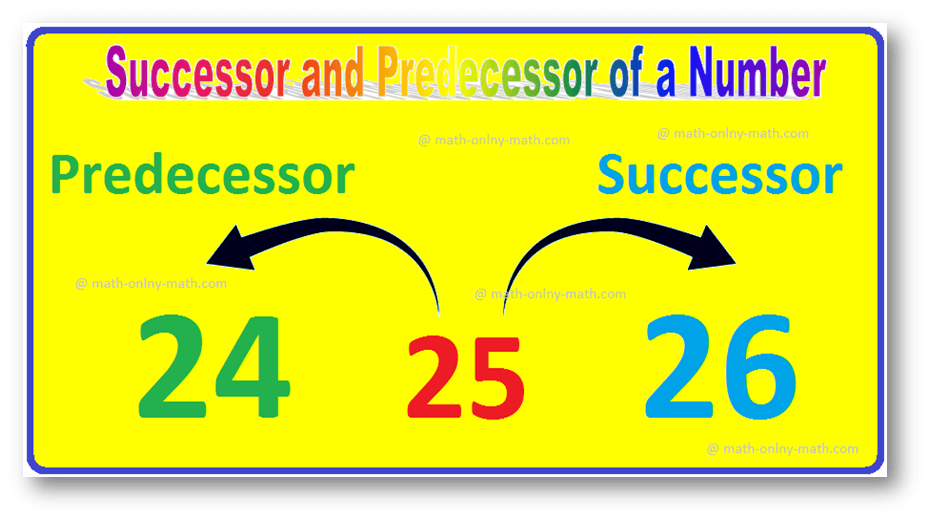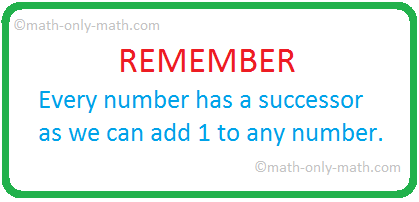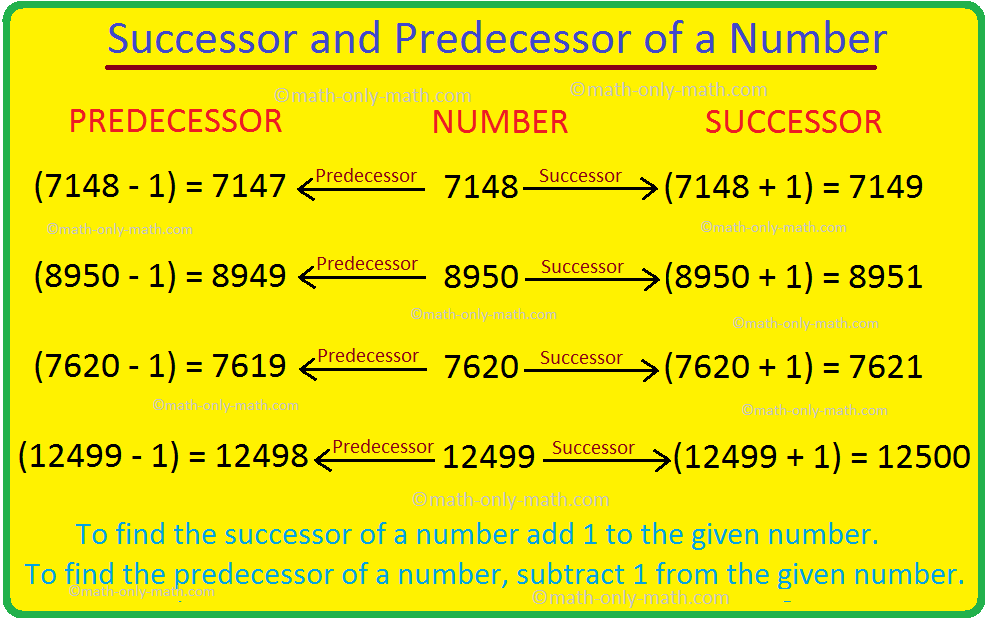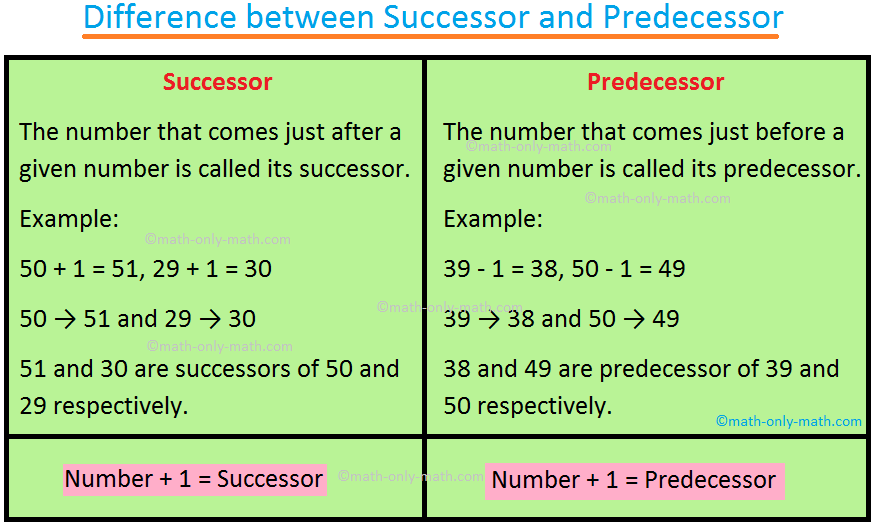Subscribe to our ▶️ YouTube channel 🔴 for the latest videos, updates, and tips.
Successor and Predecessor
The successor and predecessor of a whole number are discussed below:
What are the Successor and Predecessor?
The number that comes just before a number is called the predecessor.
So, the predecessor of a given number is 1 less than the given number.
Successor of a given number is 1 more than the given number.
For example, 9,99,99,999 is predecessor of 10,00,00,000 or we can also say 10,00,00,000 is the successor of 9,99,99,999.
Definition of Successor:
The number which comes immediately after a particular number is called its successor.
Successor and Predecessor Video:
Subscribe to our ▶️ YouTube channel 🔴 for the latest videos, updates, and tips.
How to find the successor of a number?
The successor of a whole number is the number obtained by adding 1 to it.
Clearly, the successor of 0 is 1; successor of 1 is 2; successor of 2 is 3 and so on.
We observe that every whole number has its successor.
Number + 1 = Successor
Definition of Predecessor:
The number which comes just before a particular number is called its predecessor.
The predecessor of a whole number is one less than the given number.
How to find the predecessor of a number?
Clearly, the predecessor of 1 is 0; predecessor of 2 is 1; predecessor of 3 is 2 and so on.
The whole number 0 does not have any predecessor.
We observe that every whole number, other than zero, has its predecessor.
Also, if a is the successor of b, then b is the predecessor of a.
Number + 1 = Predecessor
Solved Examples on Successor and Predecessor of a Number:
Find the successor and predecessor of each of the following whole numbers:
(i) 1000
(ii) 11999
(iii) 400099
(iv) 1000001
(v) 99999
Solution:
(i) 1000
The successor of 1000 is (1000 + 1) = 1001.
The predecessor of 1000 is (1000 - 1) = 999.
(ii) 11999
The successor of 11999 is (11999 + 1) = 12000.
The predecessor of 11999 is (11999 - 1) = 11998.
(iii) 400099
The successor of 400099 is (400099 + 1) = 400100.
The predecessor of 400099 is (400099 - 1) = 400098.
(iv) 1000001
The successor of 1000001 is (1000001 + 1) = 1000002.
The predecessor of 1000001 is (1000001 - 1) = 1000000.
(v) 99999
The successor of 99999 is (99999 + 1) = 100000.
The predecessor of 99999 is (99999 - 1) = 99998.
Successor and Predecessor of a Number Short Video:
What is Successor and Predecessor of a number?
The Successor and Predecessor of a number are explained using examples.
|
PREDECESSOR |
NUMBER |
SUCCESSOR |
|
(7148 - 1) 7147 (8950 - 1) 8949 (7620 - 1) 7619 (12499 - 1) 12498 |
7148 8950 7620 12499 |
(7148 + 1) 7149 (8950 + 1) 8951 (7620 + 1) 7621 (12499 + 1) 12500 |
To find the predecessor of a number, subtract 1 from the given number.
To find the successor of a number add 1 to the given number.
Difference between Successor and Predecessor:
Successor and Predecessor of a Whole Number
Successor of a Whole Number:
The number obtained by adding 1 to a whole number is the successor of that whole number.
Thus, the successor of 0 = 0 + 1 = 1,
the successor of 1 = 1 + 1 = 2 and
the successor of 2 = 2 + 1 = 3 and so on.
Predecessor of a Whole Number:
The number obtained by subtracting 1 from a whole number (other than 0) is called the predecessor of that whole number.
Thus, the predecessor of 1 = 1 - 1 = 0
the predecessor of 2 = 2 - 1 = 1 and
the predecessor of 3 = 3 - 1 = 2 and so on.
Note:
1. The whole number 0 does not have a predecessor because 0 - 1 (= -1) is not a whole number.
2. All the whole numbers other than 0 have predecessors which are also whole numbers.
1. Write the successor of the given numbers.
(i) 78,95,226
(ii) 10,00,999
(iii) 49,99,999
(iv) 48,09,826
(v) 8,00,78,593
Solution:
(i) The successor of 78,95,226 is (78,95,226 + 1) = 78,95,227
(ii) The successor of 10,00,999 is (10,00,999 + 1) = 10,01,000
(iii) The successor of 49,99,999 is (49,99,999 + 1) = 50,00,000
(iv) The successor of 48,09,826 is (48,09,826 + 1) = 48,09,827
(v) The successor of 8,00,78,593 is (8,00,78,593 + 1) = 8,00,78,594
2. Write the predecessor of the given numbers.
(i) 47,89,300
(ii) 89,78,515
(iii) 78,45,000
(iv) 99,30,799
(v) 85,83,221
Solution:
(i) The predecessor of 47,89,300 is (47,89,300 - 1) = 47,89,299
(ii) The predecessor of 89,78,515 is (89,78,515 - 1) = 89,78,514
(iii) The predecessor of 78,45,000 is (78,45,000 - 1) = 7844999
(iv) The predecessor of 99,30,799 is (99,30,799 - 1) = 99,30,798
(v) The predecessor of 85,83,221 is (85,83,221 - 1) = 85,83,220
Read more about Successor and Predecessor of 4-Digit Number.
Successor and Predecessor of an Integer:
Successor of an Integer:
The successor of a given integer in the integer just following it.
We get the successor of an integer by adding 1 to it.
For example,
the successor of -2 is -2 + 1 = -1.
the successor of -9 is -9 + 1 = -8.
the successor of -10 is -10 + 1 = -9.
the successor of -99 is -99 + 1 = -98.
the successor of -101 is -101 + 1 = -100.
Predecessor of an Integer:
The predecessor of an integer is the integer just before it.
We get the predecessor of an integer by subtracting 1 from it.
For example,
the predecessor of -3 is -3 -1 = -4.
the predecessor of -8 is -8 -1 = -9.
the predecessor of -10 is -10 -1 = -11.
the predecessor of -70 is -70 -1 = -71.
the predecessor of -99 is -99 -1 = -100.
the predecessor of -501 is -501 -1 = -502.
Worksheet on Successor and Predecessor of a Number:
I. Write predecessor and successor of the given number
(i)
|
Number |
Successor |
|
321 |
322 |
|
4567 |
__________ |
|
9876 |
__________ |
(ii)
|
Number |
Predecessor |
|
768 |
767 |
|
2010 |
__________ |
|
5642 |
__________ |
Answers:
I. (i) 4568, 9877
(ii) 2009, 5641
II. Write the successor of each of the following numbers:
(i) 5673
(ii) 2190
(iii) 2045
(iv) 1044
(v) 3109
(vi) 4005
(vii) 8711
(viii) 1241
(ix) 3019
(x) 7045
(xi) 4565
(xii) 8454
Answer:
II. (i) 5674
(ii) 2191
(iii) 2046
(iv) 1045
(v) 3110
(vi) 4006
(vii) 8712
(viii) 1242
(ix) 3020
(x) 7046
(xi) 4566
(xii) 8455
III. Write the successor of each of the following numbers:
(i) 5200
(ii) 4715
(iii) 8213
(iv) 5249
(v) 2801
(vi) 9236
(vii) 5612
(viii) 2076
(ix) 5912
(x) 8102
(xi) 7564
(xii) 6458
Answer:
III. (i) 5199
(ii) 4714
(iii) 8212
(iv) 5248
(v) 2800
(vi) 9235
(vii) 5611
(viii) 2075
(ix) 5911
(x) 8101
(xi) 7563
(xii) 6457
● A number that comes just before is called Predecessor.
For example, 55 comes just before 56.
● A number that comes just after any number is called Successor.
For example, 87 comes just after 86.
IV. Write the successors (the number after):
(i) 169 ............
(ii) 372 ............
(iii) 475 ............
(iv) 958 ............
(v) 568 ............
(vi) 872 ............
(vii) 928 ............
(viii) 672 ............
Answer:
IV. (i) 170
(ii) 373
(iii) 476
(iv) 959
(v) 569
(vi) 873
(vii) 929
(viii) 673
V. Write the predecessors (the number before):
(i) ............ 357
(ii) ............ 448
(iii) ............ 785
(iv) ............ 997
(v) ............ 854
(vi) ............ 362
(vii) ............ 999
(viii) ............ 575
Answer:
V. (i) 356
(ii) 447
(iii) 784
(iv) 996
(v) 853
(vi) 361
(vii) 998
(viii) 574
VI. Write the numbers between:
(i) 476 ............ 478
(ii) 758 ............ 760
(iii) 922 ............ 924
(iv) 850 ............ 852
(v) 567 ............ 569
(vi) 397 ............ 399
(vii) 624 ............ 626
(viii) 328 ............ 330
(ix) 246 ............ 248
Answer:
VI. (i) 477
(ii) 759
(iii) 923
(iv) 851
(v) 568
(vi) 398
(vii) 625
(viii) 329
(ix) 247
VII. Complete the patterns:
(i) 672, 676, 680, ............, ............, ............, ............
(ii) 840, 860, 880, ............, ............, ............, ............
(iii) 550, 500, 450, ............, ............, ............, ............
(iv) 965, 970, 975, ............, ............, ............, ............
(v) 430, 460, 490, ............, ............, ............, ............
Answer:
VII. Complete the patterns:
(i) 684, 688, 692, 696
(ii) 900, 920, 940, 960
(iii) 400, 350, 300, 250
(iv) 980, 985, 990, 995
(v) 520, 550, 580, 610
What is the Successor of a Number?
The number that comes just after a given number is called its successor.
To find the successor of a given number we add 1 to the given number.
VIII: Find the successors of each of the following:
(i) 652
(ii) 3600
(iii) 52,498
Solution:
|
(i) Successor of 652 |
= 652 + 1 |
= 653 |
|
(ii) Successor of 3600 |
= 3600 + 1 |
= 3601 |
|
(iii) Successor of 52,498 |
= 52,498 + 1 |
= 52,499 |
What is the Predecessor of a Number?
The number the comes just before a given number is called its predecessor.
To find the predecessor of a given number, we subtract 1 from the given number.
IX. Find the predecessor of
(i) 350
(ii) 9,900
(iii) 9,54,195
Solution:
|
(i) Predecessor of 350 |
= 350 - 1 |
= 349 |
|
(ii) Predecessor of 9,900 |
= 9,900 - 1 |
= 9,899 |
|
(iii) Predecessor of 9,54,195 |
= 9,54,195 - 1 |
= 9,54,194 |
X. Write the predecessor of the smallest 7-digit number.
Solution:
The smallest 7-digit number is 1000000.
The predecessor of 1000000 is 999999.
Therefore, the predecessor of the smallest 7-digit number is 999999.
Note: The predecessor of the smallest 7-digit number is the greatest 6-digit number.
XI. On dividing the successor of the greatest 8-digit number by the smallest 4-digit number, we get the quotient
(i) 1000
(ii) 9999
(iii) 100000
(iv) 0
Solution:
The greatest 8-digit number = 99999999
The successor of 99999999 = 100000000
The smallest 4-digit number = 1000
Now divide 100000000 by 1000
100000000 ÷ 1000 = 100000
Correct option is (iii) 100000.
XII. Write the successor and predecessor of
(i) 10008
(ii) 89999
(iii) 100000
Solution:
(i) The successor of 10008 = 10008 + 1 = 10009
The predecessor of 10008 = 10008 - 1 = 10007
(ii) The successor of 89999 = 89999 + 1 = 90000
The predecessor of 89999 = 89999 - 1 = 89998
(iii) The successor of 100000 = 100000 + 1 = 100001
The predecessor of 100000 = 100000 - 1 = 99999
XIII. Fill in the blanks:
(i) The successor of the smallest whole number is __________ .
(ii) The predecessor of the largest two digit number is __________ .
(iii) The predecessor of the smallest natural number is __________ .
XIII. (i) 1
(ii) 98
(iii) 0
XIV: Write the next three successors of the whole numbers after 800999.
Solution:
Successors of 800999 = 800999 + 1 = 801000
Successors of 801000 = 801000 + 1 = 801001
Successors of 801001 = 801001 + 1 = 801002
The next three successors of the whole numbers after 800999 are 801000, 801001, 801002.
XV: Write the successor of the following numbers:
(i) 2997280
(ii) 100005
(iii) 6700999
(iv) 57283289
(v) 2832100
(vi) 3520603
Answer:
XV: (i) 2997281
(ii) 100006
(iii) 6701000
(iv) 57283290
(v) 2832101
(vi) 3520604
XVI: Write the predecessor of the following numbers:
(i) 10005
(ii) 690008
(iii) 2700834
(iv) 100000
(v) 3225370
(vi) 97600890
Answer:
XVI: (i) 10004
(ii) 690007
(iii) 2700833
(iv) 99999
(v) 3225369
(vi) 97600889
XVII: Write down four consecutive whole numbers just succeeding 6700890.
Answer:
XVII: 6700891, 6700892, 6700893, 6700894
XVIII: Write down four consecutive whole numbers just preceding 5932800.
Answer:
XVIII: 5932799, 5932798, 5932797, 5932796
XIX: Write the whole numbers between 899359 and 899369.
Answer:
XIX: 899360, 899361, 899362, 899363, 899364, 899365, 899366, 899367, 899368
XX. State True or False.
(i) The smallest 6-digit number is the successor of the largest 5-digit number.
(ii) The predecessor of a 3-digit number can never be a 2-digit number.
(iii) 1000 is the predecessor of 999.
(iv) 80000 is the successor of 79999.
XX. (i) True
(ii) False
(iii) False
(iv) True
1. What is a successor in maths?
1. What is a successor in maths?
Answer:
The number that comes after a particular number is called its successor.
For example:
The successor of 86 is 87.
The successor of 605 is 606.
The successor of 2912 is 2913.
The successor of a number can be obtained by adding 1 to the number.
2. What is a predecessor in maths?
2. What is a predecessor in maths?
Answer:
The number that comes before a particular number is called its predecessor.
For example:
The predecessor of 16 is 15.
The predecessor of 158 is 157.
The predecessor of 7879 is 7878.
The predecessor of a number can be obtained by subtracting 1 from the number.
3. Write the successor of the following:
(i) 449; (ii) -32
3. Write the successor of the following:
(i) 449; (ii) -32
Answer:
(i) The successor of 449 is (449 + 1) = 450
(ii) The successor of -32 is (-32 + 1) = -31
4. Write the predecessor of the following:
(i) -259
(ii) 49
4. Write the predecessor of the following:
(i) -259
(ii) 49
Answer:
(i) The predecessor of -259 is (-259 - 1)= -260
(ii) The predecessor of 49 is (49 - 1) = 48
Related Concept
- Formation of Numbers.
- Finding Out the Numbers
- Names of the Numbers.
- Numbers Showing on Spike Abacus.
- 1 Digit Number on Spike Abacus.
- 2 Digits Number on Spike Abacus.
- 3 Digits Number on Spike Abacus.
- 4 Digits Number on Spike Abacus.
- 5 Digits Number on Spike Abacus.
- Large Number.
- Place Value Chart.
- Place Value.
- Problems Related to Place Value.
- Expanded form of a Number.
- Standard Form.
- Comparison of Numbers.
- Example on Comparison of Numbers.
- Successor and Predecessor of a Whole Number.
- Arranging Numbers.
- Formation of Numbers with the Given Digits.
- Formation of Greatest and Smallest Numbers.
- Examples on the Formation of Greatest and the Smallest Number.
- Rounding off Numbers.
From Worksheet on Successor and Predecessor to HOME PAGE
Didn't find what you were looking for? Or want to know more information about Math Only Math. Use this Google Search to find what you need.






New! Comments
Have your say about what you just read! Leave me a comment in the box below. Ask a Question or Answer a Question.